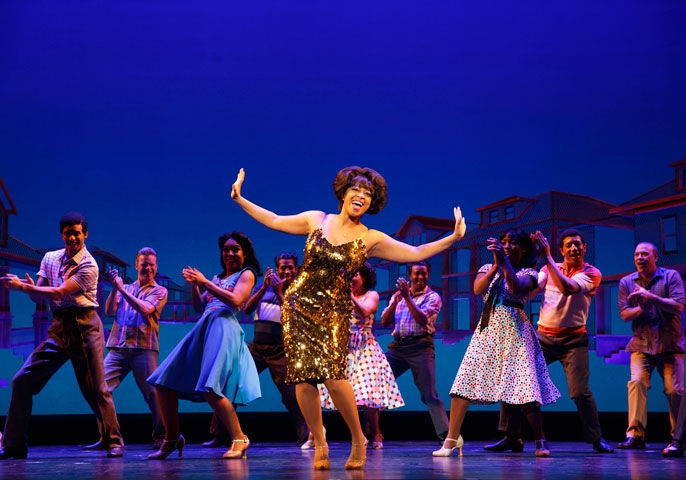The songs outshine the script — how could it be otherwise? — in “Motown the Musical,” written by none other than Motown founder Berry Gordy (adapting his autobiography, “To Be Loved: The Music, The Magic, The Memories of Motown”) and scored with more than 50 of the immortal tunes his record label issued between 1958 and 1983.
Instead of settling for being a “jukebox musical,” “Motown” attempts to squeeze 25 years’ worth of history into two-and-a-half hours. Much to Gordy’s credit, he doesn’t always present himself as Mr. Nice Guy: The story addresses his often prickly relationships with many of his artists and songwriters, as well as his lengthy love affair with Diana Ross and how his obsession with making her a superstar nearly cost him both his reputation and his business.
“Motown” is framed by the hoopla surrounding “Motown 25: Yesterday, Today and Forever,” the 1983 TV special that reminded the pop world what an astonishing star-making machine Gordy had created inside his “Hitsville, U.S.A.” headquarters in Detroit a generation earlier.
Smokey Robinson and the Miracles, Marvin Gaye, the Temptations, the Four Tops, Martha Reeves and the Vandellas, Mary Wells, the Contours, Junior Walker and the All-Stars and, of course, Ross and the Supremes were among the artists Gordy nurtured and cultivated like prize pupils back in the days when playing “race music” was forbidden on many mainstream radio stations (we see Gordy begging a reluctant DJ to play the Miracles’ “Shop Around” instead of Brian Hyland’s #1 hit “Itsy Bitsy Teenie Weenie Yellow Polkadot Bikini”).
Motown played a major role in integrating playlists, and the musical makes it clear Gordy always had his sights set on across-the-board appeal, even relocating his offices to L.A. and persuading the Supremes to sing standards in the hopes they could get booked in Vegas and swanky New York clubs.
The musical is at its best when it focuses on the atmosphere inside Hitsville, U.S.A., where Gordy (played by Chester Gregory with street-smart swagger) and his team recruited raw talent and scrutinized each song to determine if it had what it took to be a chart-topper.
But “Motown” loses its bearings and sometimes its beat when it moves outside of the 1960s and beyond the Motor City. The timeline becomes tangled as the script strains to encapsulate so many stories into a relatively brief amount of time. Although the Jackson 5 signed with Motown in 1969, “Motown” makes it appear they came onboard just as the company was headed to California, a move that did not happen until 1972.
Black Panthers and flower children are shown stomping in the streets to the beat of Edwin Starr’s anthem “War,” only to be shocked by the news of the assassination of Dr. Martin Luther King Jr. in 1968, which means they were dancing to a song that wouldn’t be released for another two years. Guess those hippies certainly were hip.
And how could a tale about Motown give such short shrift to Stevie Wonder? He doesn’t get to sing a note until midway through Act Two, and all “Motown” tells us about him is that he had a pushy, money-grubbing mom and he drove executives crazy waiting for his albums. There’s not a note or a mention of “Fingertips,” “My Cherie Amour,” “Superstition,” “You Are the Sunshine of My Life,” “Living for the City” or even the Grammy-winning landmark “Songs in the Key of Life,” although a short take on “I Wish” is wedged in late in the game.
Instead, the through line in “Motown” is the Gordy/Ross romance, which may be catnip to gossip hounds, but is not always compelling, especially since no mention is made of the daughter they conceived. Years ago, Ross hinted she might sic her lawyers on the authors of “Dreamgirls,” which fictionalized the Supremes saga; she comes off far worse in “Motown,” which portrays her as a stop-at-nothing type who woos her boss to cement her stardom.
But Allison Semmes meticulously captures both Ross’ delicate but durable voice and her often cloying “you’re all so beautiful” stage patter. In a telling moment, Gordy floats the idea of Ross becoming a solo act and the diva spends a grand total of three seconds doing some soul-searching and feeling guilty before allowing her piranha smile to break through. Less convincing are scenes depicting Gordy and Ross’ Parisian rendezvous, in which they break into “You’re All I Need to Get By” in a café (with a shooting star soaring over their heads) and Ross seduces Gordy by crooning “I Hear a Symphony” to him on a hotel balcony.
If the corniness of “Motown’s” dramatics is sometimes hard to swallow, bear in mind that most of the musical performances are impossible to resist. This is a show in which the crowd is frequently invited to clap along or sing along, but most attendees won’t need much cajoling.
The “Motown” cast skillfully captures the personalities of the artists they are embodying without doing kitschy, tribute-band-style impersonations so, for instance, when Raymond Davis Jr. slips into the purple fringe vest of Michael Jackson, he brings out the earnest essence of the pre-teen Michael while adding a bit of extra soulfulness to the picture. The Jackson 5 doesn’t show up until Act Two, but once they appear you won’t want them to leave: Davis, Malcolm Armwood, Garfield Hammonds, Elijah Ahmad Lewis and Ramone Owens deliver marvelous, irresistible covers of “ABC,” “The Love You Save” and “Who’s Loving You.”
Similarly, Semmes, Gabriella Whiting, LaTrisa Harper and Tavia Rivee are magnetic and alluring as the Supremes, and David Kaverman smoothly evokes the velvety voice of Smokey Robinson. As Marvin Gaye, portrayed as a capricious, rather spacey loose cannon, Jarran Muse is an engaging, unpredictable presence with remarkable vocal prowess, which he puts to excellent use on “What’s Going On” and “Mercy Mercy Me (The Ecology).” Gregory proves to be no slouch when it comes to selling a song, either: Gordy’s major solo is “Can I Close the Door,” a bland-ish ballad written for the show, but Gregory gives the maudlin material surprising guts and gusto.
If “Motown” can’t always get its story straight, it does a solid job of reminding us why we’re still talking about – and listening to – these legends half a century later.





